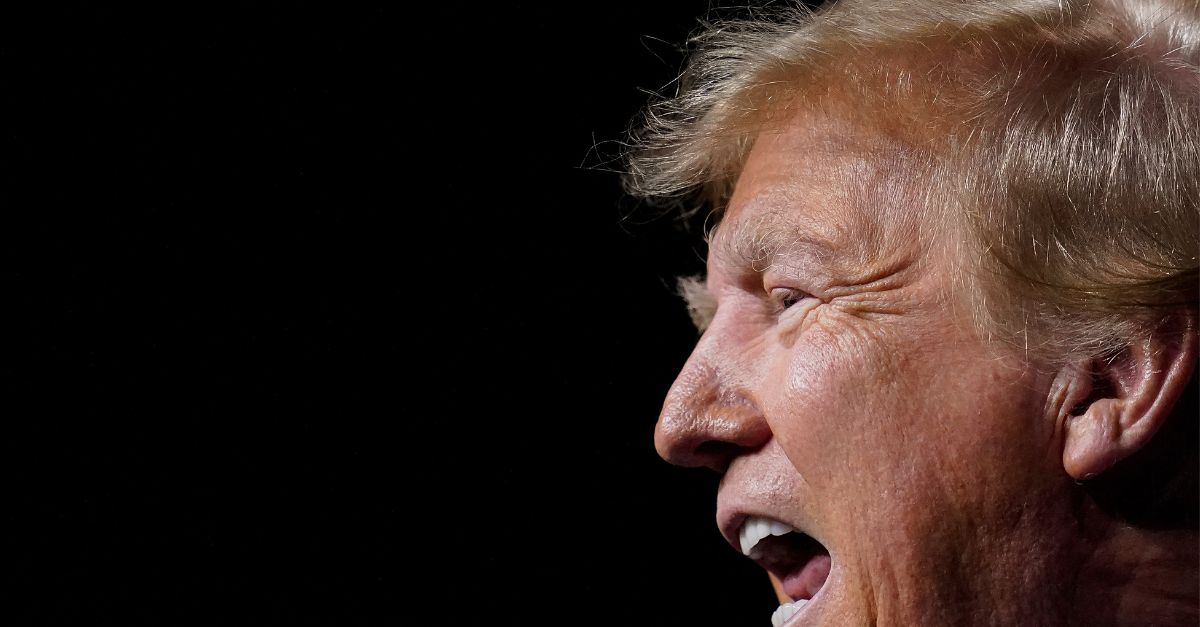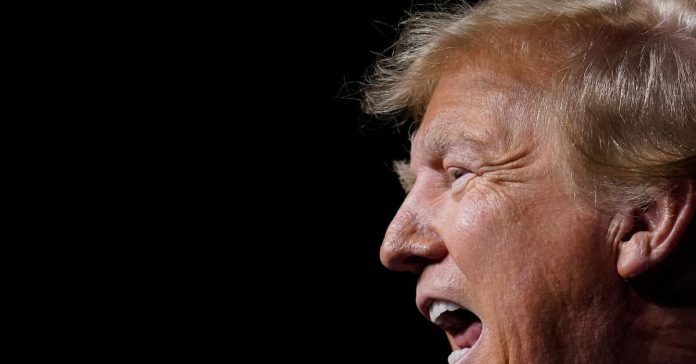
Former President Donald Trump speaks during a rally Sunday, Dec. 17, 2023, in Reno, Nev. (AP Photo/Godofredo A. Vásquez)
In light of a decision from three judges on the D.C. Court of Appeals that reinstated a gag order placed on him in his criminal election subversion case, Donald Trump has now asked that the full appellate court — all 15 judges — rehear his request.
The 17-page petition, known as an “en banc” petition, primarily argues that the appeals court erred in its Dec. 8 ruling that Trump does not have sweeping First Amendment protections over his public statements while under indictment.
The issue began when the judge presiding over Trump’s case in the lower court, U.S. District Judge Tanya Chutkan, approved a limited gag order sought by special counsel Jack Smith on the former president. It barred Trump from publicly attacking potential witnesses, court staff, prosecutors and their family members.
Chutkan’s order allowed Trump to disparage the venue of Washington, D.C., and even went so far as to allow him to disparage the nature of the charges against him. But she hemmed him in around language he might use focusing on witnesses.
Protecting the integrity of the proceedings, Chutkan explained, was paramount. Trump appealed.
After the three judges on the appellate panel finally heard arguments, they opted to uphold most parts of Chutkan’s order with one notable exception: Trump could still publicly criticize and decry special counsel Jack Smith.
“Prosecutors are vested with immense authority and discretion, including the power to take steps that can result in the persons’ loss of liberty. The public has a weight interest in ensuring that such power is exercised responsibly. And criminal defendants facing potential curtailments of liberty have especially strong interests in commenting, within reasonable bounds, on prosecutors’ use of their power,” the judges wrote.
Trump’s lawyer John Lauro argued in Monday’s filing that this ruling “silenced” the former president and arrived in conflict with precedent established by the U.S. Supreme Court and in rulings from the Fifth and Sixth Circuits.
Particularly troublesome to Trump, Lauro writes, is the appellate panel’s ignorance of the Supreme Court’s “clear and present danger” test for free speech.
Trump’s lawyers have so far unsuccessfully argued that special counsel has been unable to point to definitive evidence or proof that his rhetoric about the indictment or prosecutors will spur violence.
Addressing violence that might occur after the fact was also not a convincing argument by the D.C. Court of Appeals standard.
In an opinion led by Judge Patricia Millett, she blasted Trump.
He “gives no inch to the need to protect the criminal justice process,” Millett wrote. “He miscasts Supreme Court precedent discussing ‘clear and present danger’ as preventing the district court from doing anything at all to curb speech other than duplicate existing criminal prohibitions against influencing witnesses.”
Millett, appointed by President Barack Obama, continued: “Tellingly, Mr. Trump was unable to identify any example of speech that could be protectively proscribed by the district court that was not already a violation of the criminal law, and so also of his release condition to comply with applicable federal, state, and District laws.”
No matter what the full court decides, it is nearly a guarantee that the former president will press the issue to the Supreme Court.
Trump has pleaded not guilty to four charges in Washington, D.C., alleging that he criminally conspired to overturn the results of the 2020 election.
For now, Trump’s trial in the nation’s capital is slated to begin March 4 and special counsel prosecutors are intent on keeping things on track while Trump appears motivated only to delay the process as he pursues a trial that would start after the 2024 election, if ever.
Last week Smith went directly to the Supreme Court and asked the justices there to resolve whether Trump is immune from criminal prosecution for crimes committed while in office.
Smith’s ask skipped over the appeals court altogether, a rare move in itself. Chutkan had already ruled that Trump was not “absolutely immune” and in that same vein, Smith also asked the high court to decide whether Trump is protected from prosecution under rules of double jeopardy. He contends that because he was impeached by the House of Representatives for his actions related to Jan. 6 and acquitted by the Senate, indictments from federal prosecutors should be moot.
The Supreme Court agreed to hear Smith’s request on the expedited schedule and the 1-page order gave Trump’s legal team until this Wednesday, Dec. 20, to reply.
Have a tip we should know? [email protected]

